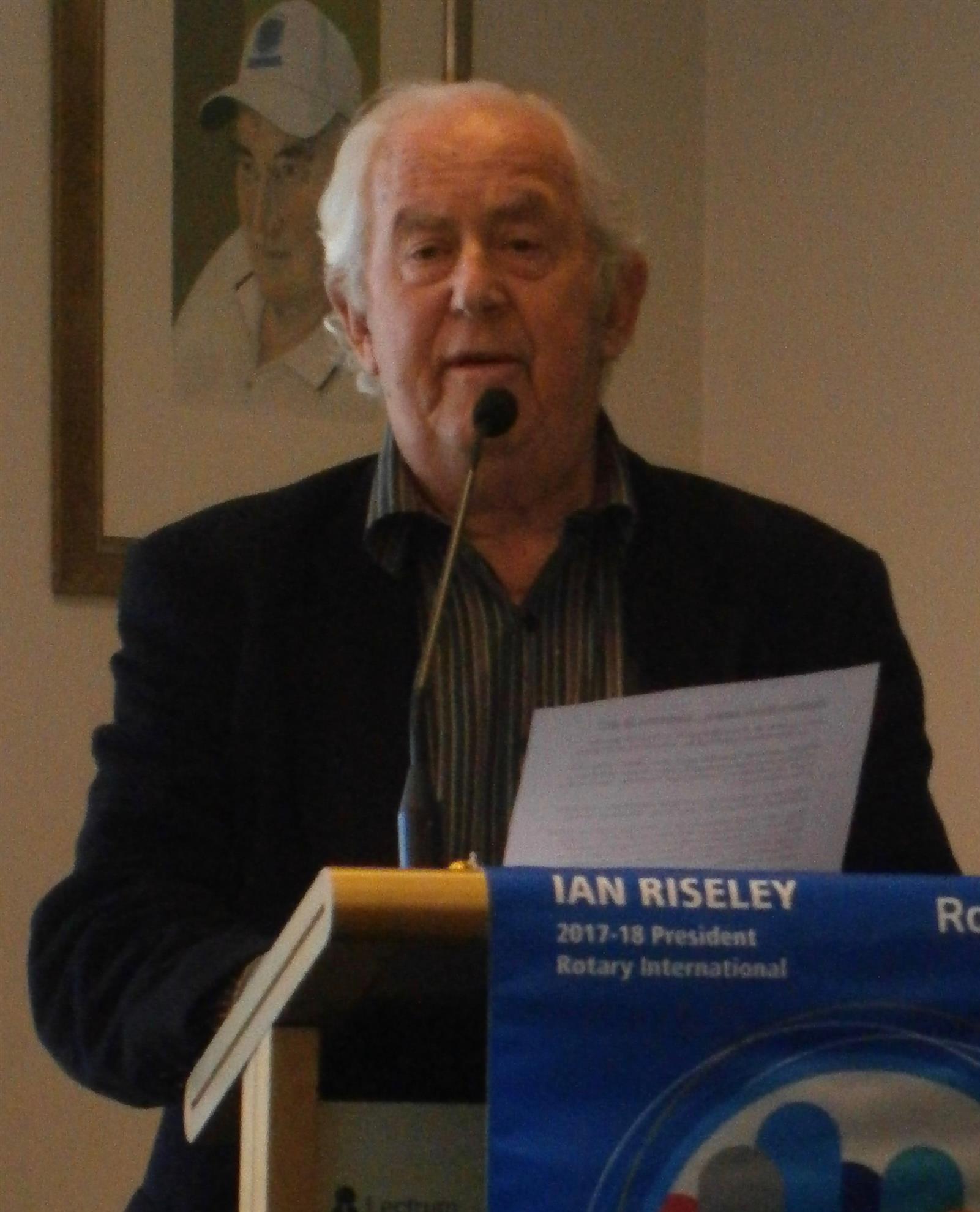Brian Morley intrigued the club with his memories of a fifty-year career in Journalism and Broadcasting.

Isn’t it great to be alive in Melbourne in Grand Final week! The atmosphere; public holiday; anticipation of the game,
It brings memories of football years past – when football was more of a sport than a profession; when players held down a proper job and trained Tuesdays and Thursdays, ready for the game on Saturday
And it brings memories of some great grand finals – and some fascinating events around Grand Finals.
Memories like this …
1935 – Star South Melbourne full forward Bob Pratt was forced to withdraw from the grand final after he was hit by a truck in trying to cross the road the day before the game. Pratt had booted 362 in three seasons. Without him the Swans lost to Collingwood by 20 points, despite having as many scoring shots as the Magpies.
1951 - Essendon's last match of the home-and-away season, Carlton fullback Harry Caspar and Essendon full forward John Coleman each reported for punching and each suspended for four weeks. It was confirmed by two umpires that Coleman had retaliated to punches by Caspar, but this did not sway the Tribunal. Thus Coleman missed the finals including the Grand Final which was won by Geelong by 11 points.
1964 – The famous game in which Collingwood big man Ray Gabelich scored a goal in the dying minutes. With five minutes to go, the ball had been passed to Gabelich by Des Tuddenham. Gabelich then ran awkwardly towards the Collingwood goal, struggling to control the ball, and bouncing the ball four times in a run of, at least fifty yards and, then, kicking a goal that put Collingwood in front. However, a minute later, Melbourne defender Neil Crompton kicked a goal, putting Melbourne in front by four points. Collingwood were unable to score again.
1966 – St Kilda won their first premiership in 69 years of competition, defeating Collingwood by a solitary point. With only moments left, the two sides were locked level. Finally, Barry Breen snapped the point that gave the club its first and to date only premiership in its history. Every young footballer’s dream –
to beat Collingwood by a point in the Grand Final! A pity we couldn’t repeat the dose in 2010 …
My football experiences were centred on the 1960s and 70s. I was a journalist in the 3AW Newsroom with football/sport as an extra-curricula activity.
My journalistic experiences are the subject of other discussions – starting at The Age in Collins Street in 1956, moving to 3AW in 1960, a stint at Channel 0 when it opened, then back to 3AW.
My time in the 3AW newsroom experienced some of the biggest stories of the 60s and 70s.
I covered all the major stories of the era:
the execution of Ronald Ryan, the last man hanged in Australia. I was one of the official witnesses at the execution. It was an event that haunts me to this day.
the collapse of West Gate Bridge and prior to that, the collapse of the King Street Bridge
the disappearance of Prime Minister Harold Holt
the assassinations of President Kennedy, Robert Kennedy and Martin Luther King
the start of the ‘space race’ between the US and USSR
man’s first landing on the Moon
the Vietnam War rallies on the streets of Melbourne – and of course the Vietnam war
the Beatles visit to Melbourne
a Royal Tour to Australia
Bart Cummings’ first Melbourne Cup win
the “It’s Time” election victory of Gough Whitlam and the ALP
Extraordinary times and extraordinary stories.
In the midst of all that came football!
Being selected to call the football with Harry Beitzel was one of the biggest thrills of my life. He was one of the “true voices of football” in Melbourne. And of course with Harry Beitzel came one of the great characters of the football world – “Turkey” Tom Lahiff. They were inseparable when it came to football broadcasting.
The Macquarie Radio Network decided to go national with its news service – with its HQ based in Sydney.
I was offered the opportunity to go to Sydney to be the National News Editor and quite frankly as a journalist, it was an offer not to be refused. So in June 1972 I moved to Sydney with my family.
The implications for the football broadcasts were quite significant. I was needed for the call – and there was really only one solution: fly down to Melbourne on Saturday morning, call the game, and fly back to Sydney on Saturday evening.
A postscript to this part of my working life was that when I decided to return to Melbourne to live and work in the middle of 1973, 3AW asked me to do the studio anchoring job for Saturday afternoons in the football season.
After a career in Broadcasting, Brian Morley became a Public Relationship Representative, representing Alcoa, the SEC, CityLink and the Royal Melbourne Show. He remained active in football broadcasting.